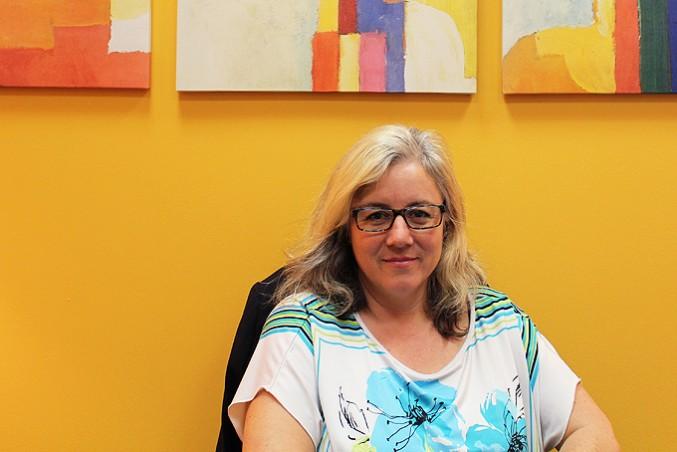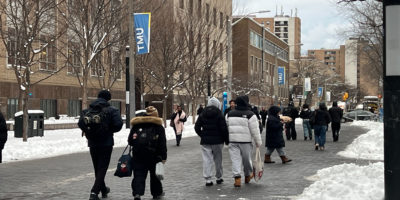Sociology professor Jacqui Gingras was a candidate for the New Democratic Party (NDP) in last month’s federal election in her home riding of North Okanagan-Shuswap in British Columbia. Gingras did not get elected and is back to teaching at Ryerson. Badri Murali sat down with her to ask a few questions about her experience.
Where are you originally from?
I’m from that area [North Okanagan-Shuswap in British Columbia], born south of there and grew up on a farm just south of the riding.
Why did you get involved with the NDP and how did you do so?
I’ve always been concerned about social justice and even in my academic work, I’ve done research projects in health and nutrition that were focused on looking at challenging the status quo and looking at who benefits and who doesn’t. So it is a natural fit for me and when Jack Layton died in 2011, I felt really moved to serve and was inspired by his work, his tireless efforts here in this city and beyond. I just thought well, what’s stopping me from serving in that way, given all the life experiences that I’ve had up until that moment? So my campaign really did begin the fall of 2011. And I called the NDP and said, “I would like to run in the next federal election,” and they said, “well, that’s not for another four years so why don’t you call us back in three and a half years?” And I remember thinking to myself the area that I wanted to run in is so strongly Conservative in terms of who it elects and I thought that I probably needed to get started now to have any chance and so I did. I went and talked to the Riding Association and I asked if they had a candidate and they didn’t and so we just started a conversation. I moved into things like that in 2011 just after Jack passed.
What is your educational background?
Well, right now, I’m teaching sociologies of food and education and health. I have a PhD in education which I received from UBC in Vancouver and I also have a professional designation as a dietician. My area of research is exploring the intersections between sociology, education, health and health professions. So in other ways, looking at social aspects of how future health professionals are educated and what that means in terms of their practice.
How long have you been at Ryerson?
I started here in August 2006. I’ve had incredible opportunities here. There are so many potential projects and people to work with here. It’s a very exciting place to be a professor, so I’ve enjoyed so many relationships here. That was part of the campaign I created as well, it was really to look at a politics of community, politics of belonging. An attempt to see myself as a facilitator of connections, to see myself as an advocate, as a person who could help speak for and stand for adults who aren’t able to.
Tell me how the campaign went and everything that happened.
The campaign was exhilarating. It was a highly creative process with lots of opportunities to connect with people. The riding is a big area, so there were over 13 community forums and so for about a two to three week period, there was a forum or gathering in a small community almost every night and that was a remarkable way to connect with people just in terms of the questions asked and being able to respond. I put forward a vision I had for that area, a vision where people had homes, they were housed. They had food, they weren’t hungry. They had support for addictions and mental illness, support and recovery. There was a sense of very strong social connections and so that’s what we built the campaign on. We started with a hashtag #BetterTogether, with the idea that by knowing each other, by getting on and actually talking to each other and listening to each other’s stories that we could actually build stronger communities. And so looking at it more broadly, some of the social policies like $15/day National Child Care program and $15/hour federal minimum wage, raising corporate taxes, and that corporations were paying their fair share so we can lift children out of poverty. In B.C, 20 per cent of kids and 20 per cent of seniors live in poverty so that to me is absolutely unacceptable and that’s one of the things I would talk about to people is that we’re all not doing well here, so how can we take care of each other with a little more compassion. And then we started focusing on the time. So, it’s the time for these things to change and we can’t reconcile these social problems to persist, it’s time to elect a gov’t that holds people as the centre.
What were the challenges?
A couple of challenges emerged. One was that in 2013, two years prior, B.C. had a provincial election and many people worked on those campaigns and the NDP had been polling very high yet when it came down to the election, they lost really badly. And so, a lot of the volunteers who worked on that campaign were burned out and so asking them once again to give everything they had for a federal campaign, it was really difficult and so garnering that kind of massive volunteer effort was a unique challenge because of how hard people fell in 2013. It’ll be interesting to see in two years what will happen in B.C because we’ll be having another provincial election and we’ll see if people are capable of coming forward again, I would understand if they aren’t able. So we had a great team, not to take away from everything we had, but we could have done with more hands on deck to reach the people who’ve never voted before. I always believed, and found it out to be true, that more people would vote this election than have voted in a very long time. And they did, so that was good.
What were the results in your riding?
The Conservatives won, they had held it before. There was no incumbent running so everyone who ran in that was new. The Liberals came in second and we were in third.
If you could do anything differently, would you?
Well, in the moment, the decisions we made, I felt really good about. But if I could, I would try harder to connect with groups who have never voted before or those who don’t often vote in my riding, like young people and those in the 35-45 year-old age group. We really cemented our base of supporters and added on to it, so now that I’m finally back here, I’m going to be really reflecting on a lot of the work we did and what could have been done better.
As a social scientist, what were your thoughts on this campaign?
Well, to be able to study and observe the process at arm’s length would be a fascinating thing to see how people respond to certain ideas and all those hundreds of conversations with people at their doorsteps, around kitchen tables and at community forums. Every single one of those forums were packed and people were so engaged and the people who attended those forums, many of them were vocal and active in their frustration with the Conservative Party and the Harper Conservative government. They would yell things out, so looking at how those microcosms of activity were not necessarily reflected in the final vote count. So I’d love, as a social scientist, to go back and study that. That would mean going back to talk to people, to interview people about their understanding of what they were seeing as outsiders in regards to that campaign because when you’re a candidate, you’re literally in the centre of this very dynamic process. So I would go back and ask, “What are you hearing from the outside?” It’s hard to have a truly unbiased view of the process. But as a social scientist, I desire that, not an unbiased view, but a view from many different positions.
So you said you teach sociology of health, education and food at Ryerson. Are you going to take any lessons from this campaign and bring it to your classroom?
Absolutely. Even today I was talking about our food system, I’m teaching the sociology of health and was talking about the food system and how it’s changed and how in that riding, there’s a group called the Young Agrarians and it’s basically young people who want to farm and how political that act is to grow our own food now as a subversion of corporatization of food, and so I spent time with the Young Agrarians and I went to their meetings and I could talk about what their challenges are in context of the campaign and of course bring that experience. I touched it, I’ve been close to it, so it’s not just a theoretical thing these are people’s lives, who are working really hard to try and take back the food systems from the corporate agenda. So it’s been tremendous and a lot of those lessons, I don’t even know yet what I’m able to take away but they will reveal themselves as I continue to reflect and encounter some of the ideas from my students in the classroom.












Leave a Reply